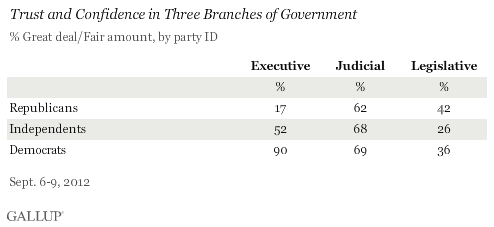PRINCETON, NJ -- Americans trust the judicial branch most and the legislative least of the three branches of government, with trust in the executive branch falling in between these two. Trust in all three branches is up slightly this year, but from a longer-term perspective, the legislative branch has lost by far the most trust over the last 10 years.
![Trend: How much trust and confidence [do] you have at this time in the executive branch headed by the president, the judicial branch headed by the U.S. Supreme Court, and the legislative branch, consisting of the U.S. Senate and House of Representatives?](http://content.gallup.com/origin/gallupinc/GallupSpaces/Production/Cms/POLL/_qvjizdhmuoo578wjdyjxq.gif)
Gallup's latest update on trust in the branches of government was included in its Sept. 6-9 Governance survey. The data reflect the same general pattern that has been evident since 2009 -- with the judicial branch on top, the legislative branch on the bottom, and the executive branch in the middle. All three branches are slightly more trusted this year than last.
Between 2003 and 2008, the legislative branch was trusted at least slightly more than the executive branch -- a period coincident with then-President George W. Bush's controversial decision to go to war in Iraq. Prior to 2003, neither branch had a consistent advantage in trust, although in 1974, in the middle of Richard Nixon's Watergate scandal, trust in the executive branch fell to its lowest point in Gallup's history of asking this question.
The judicial branch has with one exception always been more trusted than the other two branches, although at several times by a narrow margin. The exception came when Gallup first asked the question, in May 1972, when the executive and legislative branches were rated slightly higher. Americans trusted the judicial branch most in the late 1990s, during the Senate impeachment trial of Bill Clinton -- which the chief justice presided over in the Senate. Even in recent years, when trust in the other two branches has fallen, the judiciary has held its own -- dropping to 63% who had a great deal/fair amount of trust last year but recovering this year to 67%.
Americans' trust in the legislative branch has dropped substantially over the last 10 years, from 67% in 2002 to 34% this year, although the 2012 figure is up slightly from last year's all-time low of 31%.
Trust in the executive branch dropped along with trust in the legislative branch throughout the last years of the Bush administration, but jumped after President Barack Obama took office in 2009, and has remained significantly higher than the legislative branch since. Trust in the executive branch was down in 2010 and 2011, but is up this year to 56%.
Trust in the executive branch reflects significantly larger partisan differences than is the case for the other two branches, as might be expected because the president -- one individual elected as a representative of one particular party -- embodies this branch. At this point, 90% of Democrats trust the executive branch, contrasting with 52% of independents and 17% of Republicans. Republicans have slightly higher trust in the legislative branch than do Democrats, with independents at the lowest level. Trust in the judicial branch is slightly lower among Republicans than among the other groups.

Implications
The Constitution specifies that the U.S. government consists of three branches -- each of which is in theory co-equal, despite having distinct powers and responsibilities. In terms of public image, however, the three branches are currently quite unequal. Americans have the most trust in the judicial branch, less in the executive branch, and reserve their lowest trust for the legislative branch. The Founding Fathers set up the legislative branch, of course, to directly represent the people. The low level of trust rank-and-file Americans have in that branch thus signifies at least a temporary disruption in what the Founders may have envisioned.
Survey Methods
Results for this Gallup poll are based on telephone interviews conducted Sept. 6-9, 2012, with a random sample of 1,017 adults, aged 18 and older, living in all 50 U.S. states and the District of Columbia.
For results based on the total sample of national adults, one can say with 95% confidence that the maximum margin of sampling error is ±4 percentage points.
Interviews are conducted with respondents on landline telephones and cellular phones, with interviews conducted in Spanish for respondents who are primarily Spanish-speaking. Each sample includes a minimum quota of 400 cell phone respondents and 600 landline respondents per 1,000 national adults, with additional minimum quotas among landline respondents by region. Landline telephone numbers are chosen at random among listed telephone numbers. Cell phone numbers are selected using random-digit-dial methods. Landline respondents are chosen at random within each household on the basis of which member had the most recent birthday.
Samples are weighted by gender, age, race, Hispanic ethnicity, education, region, adults in the household, and phone status (cell phone only/landline only/both, cell phone mostly, and having an unlisted landline number). Demographic weighting targets are based on the March 2011 Current Population Survey figures for the aged 18 and older non-institutionalized population living in U.S. telephone households. All reported margins of sampling error include the computed design effects for weighting and sample design.
In addition to sampling error, question wording and practical difficulties in conducting surveys can introduce error or bias into the findings of public opinion polls.
View methodology, full question results, and trend data.
For more details on Gallup's polling methodology, visit www.gallup.com.
